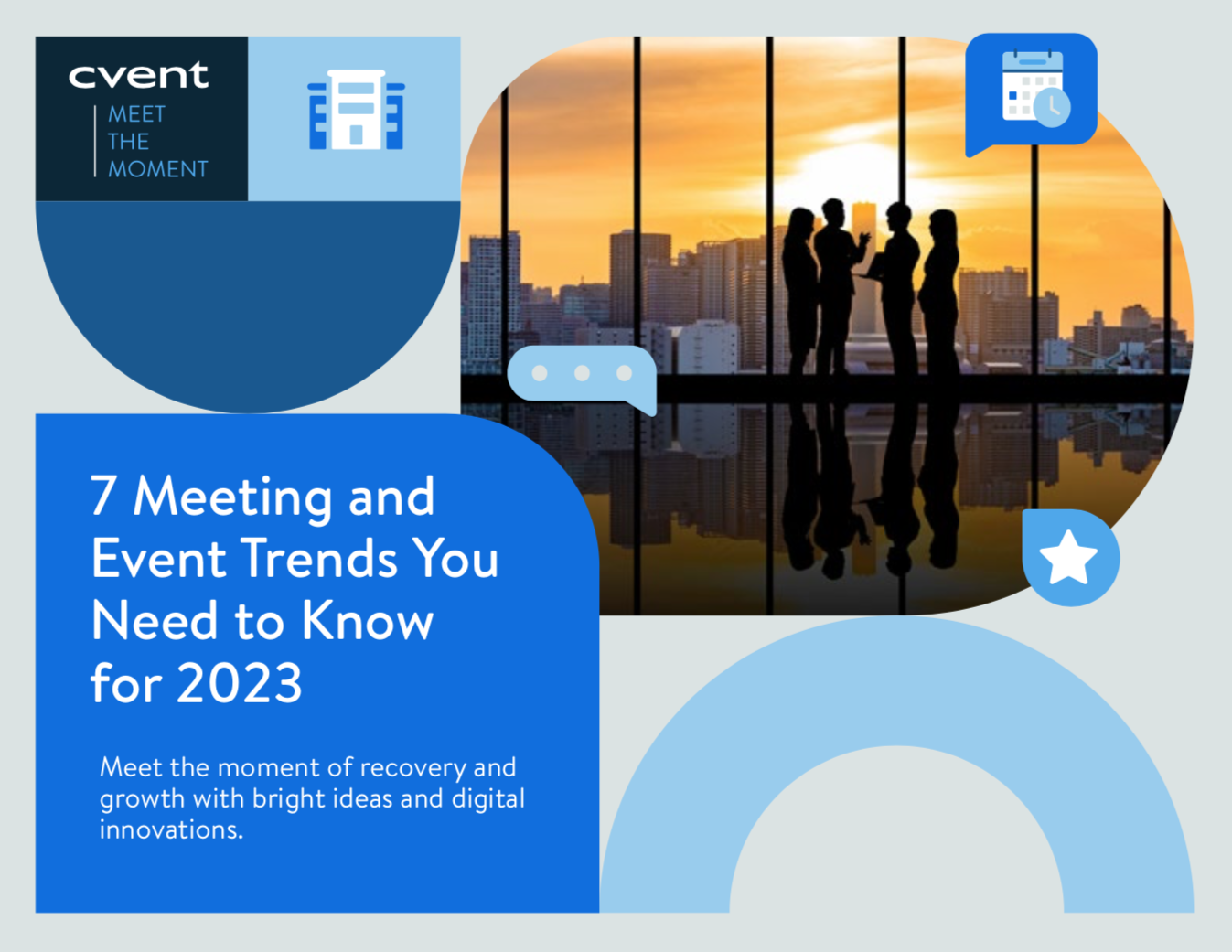7 Meeting And Event Trends Venues And Hotels Need To Know For 2023

Many thought 2021 was primed to be the year of the comeback – but it turned out to provide just a glimpse of the event industry rebound to come. 2022 has shown the enthusiasm for in-person meetings, and the promise of the events industry moving forward.
Cvent recently published an eBook with seven top meeting and event trends venues and hotels need to know for 2023.
The eBook is designed to help navigate the booming return to events and evolved planner expectations, with recommendations to help venues attract and win business events including:
- The best ways to handle the surge of events expected in 2023
- What event planners expect from their venue partners in this new landscape
- How inflation is affecting the ways in which planners make decisions
- The ways in which venues can use social consciousness to draw in more events
The Trends
Trend 1: Planners anticipate a surge in future bookings
Looking into 2023 and beyond, event professionals are more optimistic than ever about the meetings and events industry. The October 2022 Cvent Planner Sourcing Report: Europe Edition, revealed that 83% of event planners said that they expect to host more in-person events in 2023 compared to 2019.
This is positive news, as long as venues are prepared to efficiently handle the influx of meetings and events. It's more important than ever to have informed and experienced staff on hand to respond to planner’s needs.
Trend 2: A renewed focus on time, experience and investment for attendees
The October 2022 Planner Sourcing Report found that 29% of planners expected hospitality partners to help them maximise the event experience by finding creative space solutions and focusing more time and effort on helping them create better events.
After not being able to meet – or not being able to meet in the ways they were accustomed to – since the onset of the pandemic, there’s now a heightened focus on the return on time, experience, and investment for event attendees. Content is still king, but it’s also about forging meaningful connections and having unique and unforgettable experiences that attendees have missed out on in the past two years.

Trend 3: Venue selection will be influenced by social activism
The pandemic has caused people to be more socially conscious. A Shopkick survey of over 10,000 consumers in 2021 found that 39% are researching company values to assure they align with their own. Valuegraphics, which refers to a more holistic way of looking at a person are also important. David Allison, a consumer behaviour expert, and his team surveyed 750,000 people around the world and identified 56 shared core human values.
Planners can use this information to better understand what motivates their attendees, how to better market to them, and how to provide them with more engaging content. In learning more about their attendees’ core values, planners will want venues to help them create activities and opportunities that reflect those priorities.
Trend 4: The triple threat of hybrid, virtual and in-person event types
At Skift Meetings’ Future of the Event Industry Summit 2022, over half of attendees polled said they would primarily be using hybrid event formats in the latter part of the year. The digital transformation of the industry, driven by the pandemic, means that hybrid events and virtual components of in-person events are here to stay as they can reach more attendees and the recorded content can live on long after the event is over.
The triple threat of hybrid, virtual and in-person event types is a powerful benefit for businesses, and something that venues must be prepared to support. This means having access to the latest technology and being able to help planners create high quality video content. High-speed internet connections with ample bandwidth are no longer enough. If venues cannot provide all of the necessary elements for a hybrid event onsite, they should be prepared with a list of experienced vendors who can assist planners in bringing their vision to life.
Trend 5: Event planners will focus on health and wellness activities
The Global Wellness Institute projects a 21% annual growth rate for wellness tourism through 2025 – this means an increased interest in spas, thermal/mineral springs, sustainability, and mental wellness.
For event venues, highlighting local wellness attractions and amenities like a bathhouse, farmer’s market or spa can attract more planners who are looking to treat their attendees to a few days of mindfulness.
Venues should also consider incorporating some of these elements onsite including inviting local farms to set up stands for a mini-farmers market, provide farm-to-table cooking classes, and collaborate with a spa to arrange specialised treatments.
Trend 6: Planners are choosing leisure destinations more frequently
Research published in the National Bureau of Economic Research (among other sources) cites remote work as causing an increase in working hours in 2020 and 2021; fast forward to 2022 and the response has been an increase in bleisure trips. While this was increasing prior to the pandemic, it's continuing due to changes in work habits.
Venues should emphasise the staycation value of their property and showcase experiences attendees could check off their bucket list.
Trend 7: Virtual Reality (VR) is no longer just for video games
Imagine if planners were able to use a VR headset to see exactly what the event space would look like when guests arrive or during the keynote. Technological advances like this would certainly save time and increase the saleability of the venue, such as allowing meeting planners to use augmented reality (AR) to walk through a room with a device and see a variety of room setups in real-time.
As new technologies such as VR/AR roll out, event professionals will want to integrate these powerful tools into their programmes to build their events and reshape the experience. When VR technology becomes available at the sourcing stage, planners will have access to world-class venues across the globe, right from the comforts of their offices or homes. VR has the potential to change the way they source venues, plan events, collaborate with onsite staff and engage participants all over the world.
To view and download the complete eBook, which contains additional industry resources for venues and hotels to tap into, click here.
Other Articles
About Us
Supported by the Union of International Associations (UIA), the International Association of Professional Congress Organisers (IAPCO) and the Interel Group, the global public affairs and association management consultancy, Headquarters Magazines serve the needs of international associations organising worldwide congresses.
















